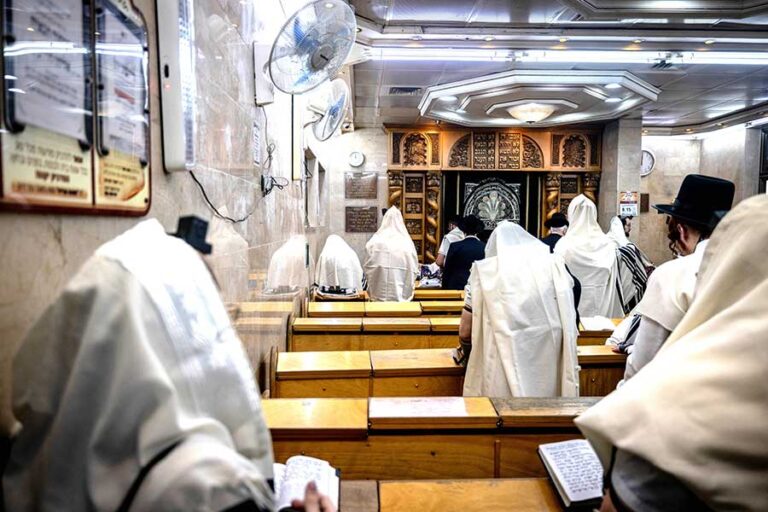Two days before Yom Kippur, Mr. Mandel’s son, Aharon, called him.
“I planned to be in yeshiva for Yom Kippur,” Aharon said, “but my wife hurt her back. It will be hard for her to watch the kids, so we’d like to come over to you.”
“You’re certainly welcome,” replied Mr. Mandel. “Your sister is coming with her kids, so Imma will be home most of the day regardless.”
“Are seats still available for davening?” Aharon asked.
“The shul is quite full, but I’ll check,” said Mr. Mandel. “Mr. Neiss sits next to me, with a single seat. Perhaps he’ll be willing to move.”
Mr. Mandel asked the gabbai about purchasing an extra seat for Yom Kippur. “I’m sorry, but all the seats are taken,” the gabbai replied. “However, we always leave ten seats at the back of the shul for visitors on a first come basis.”
Aharon took a seat in the back for Kol Nidrei. When Maariv began, after the Rav’s drasha, Mr. Neiss still hadn’t come. Aharon moved next to his father.
The following morning, again Mr. Neiss didn’t come. “Mr. Neiss fell just before Yom Kippur and hurt his leg,” a neighbor said. “He’s okay, but he said that he can’t walk here and will daven in the shul next door to him.”
“Then you can use Mr. Neiss’s seat the whole day,” Mr. Mandel said to Aharon. “I’ll settle with him after Yom Kippur.”
After Yom Kippur, Mr. Mandel came to pay Mr. Neiss for the seat. “Why should you pay?” replied Mr. Neiss. “The seat would have remained empty otherwise.”
Mr. Mandel asked Rabbi Dayan:
“Do I owe Mr. Neiss for use of the seat?”
“This is like a case of ‘zeh neheneh v’zeh lo chasser’ – A gains and B doesn’t lose,” replied Rabbi Dayan.
“The Gemara (Bava Kama 20b) concludes that if A used B’s property that is not meant for renting out, post facto A does not have to pay B, even if otherwise A would have rented elsewhere. Although A gained – as he did not have to rent elsewhere – since B had no loss, A does not have to pay him, post facto (C.M. 363:6).
Here, too, Mr. Neiss’s seat was not meant for renting out, so he did not lose anything through Mr. Mandel’s use. Therefore, although Mr. Mandel was willing to purchase another seat, he does not have to pay Mr. Neiss.
Of course, this does not preclude Mr. Mandel from compensating Mr. Neiss as a gesture of goodwill.
However, normally, A is not allowed to use B’s property initially without permission, unless he knows that B does not mind. Moreover, if B told A explicitly not to use his property, even in a case of zeh neheneh v’zeh lo chasser, A is liable to pay B for the use (ibid.).
Regarding seats in shul, though, these qualifications seemingly do not apply. In halachic literature from hundreds of years ago, seats in shul were owned, rented, and sold, like other real estate (C.M. 97:23). However, nowadays, seats in shul are not usually owned or even rented from the shul by the people who sit there; it is not their property. They are merely granted priority by the shul to sit there.
Many shuls even have a policy that after a certain time (e.g., half an hour after davening begins), it is permissible to sit in reserved seats.
“Thus, if it is known that Mr. Neiss will not come to shul, Mr. Mandel is permitted to use the seat,” concluded Rabbi Dayan. “Similarly, even in the unlikely case that Mr. Neiss would explicitly say not to use his seat, Mr. Mandel would not have to pay for using it, post facto.”
Verdict: A person who sits in a reserved seat that is not used does not have to pay the “owner” of the seat, like a case of zeh neheneh v’zeh lo chasser. Moreover, if it is known that the “owner” will not be using the seat, it is permissible to use the seat.
To receive BHI’s free newsletter, Business Weekly, send an e-mail to [email protected].
This article is intended for learning purposes and cannot be used for final halachic decision. There are also issues of dina d’malchusa to consider in actual cases.
1. The lizard was able to regenerate its tail after it was severed by a predator.
2. The doctor prescribed a cream to help regenerate the skin cells on the patient’s burn wounds.
3. The forest began to regenerate after a devastating wildfire swept through the area.
4. The company implemented a new marketing strategy to help regenerate interest in their products.
5. The athlete focused on rest and recovery to help regenerate their muscles after a strenuous workout.
Source link


